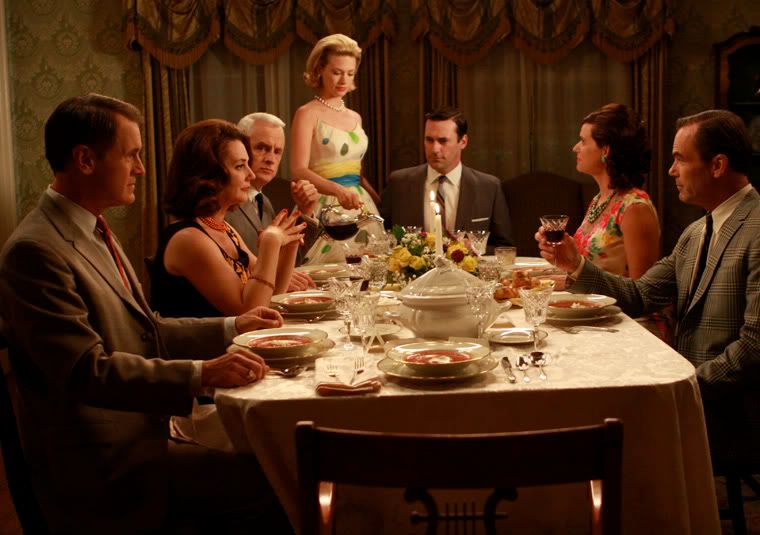
This weekend, a friend and I were sharing the cooking duties for a Super Bowl party, and had more or less figured out what we were going to cook. And then a monkey wrench was thrown into the plans -- some of the guests for the party let my friend know that they were newly vegetarian. But you know what? As frustrating as it was to scrap our shrimp and sausage gumbo idea, having a two chili (one meat* and one black bean) menu was just fine, and we were both really happy that the people who came all ate and enjoyed the food. And afterward, we talked about how awful it would have been if the vegetarians hadn't let us know.
Almost all of us have a food that we won't or can't eat, either because of allergy, religion, health, morals, or just plain dislike. We have all learned how to deal with this at restaurants, by scouring ingredient lists for the dreaded cilantro (which I happen to love, but once went to lunch with a friend who insisted on leaving the restaurant because she didn't see anything on the menu without it), asking detailed questions to the waiter about whether that veggie burger contains mushrooms, or steering your friends toward the bread pudding instead of the creme brulee for the shared dessert. And it's easy around your family, because we always know about our sister's unusual hatred for chicken, the uncle who doesn't eat salmon, the vegan cousin, and dad who doesn't eat cooked apples. But what about when you're going to a dinner party with people that you don't know that well? Well, we are here to tell you, don't leave your host in the dark.
I love to cook for people, and I do it often. When I cook for people, it's not just to experiment with something new in the kitchen or impress with my cooking skills (though, sure, that's part of it), it's to make food that someone else will enjoy, and to have a happy meal with friends around a table. So when someone comes to my home, I want to please them, and I absolutely do not want to serve them anything that they can't or won't eat. If you are a vegetarian, I will absolutely make sure that there is a vegetarian main dish and appetizer for you, if you are lactose intolerant, well then I'll scrap that cheesecake for dessert, or maybe have two desserts. But for the love of God, don't be shy about this information, because then you'll be sitting around hungry, and I'll think that you either think that I'm seriously rude, or that my food is disgusting, and that's a recipe for a sad ending to a party.
Now, I'm not saying to email your host in advance with a list of your food preferences, or ask to approve the menu, because that would make us devote six or seven paragraphs to your behavior here on Don't Do That. But if you're not sure that your host knows that you're allergic to shellfish, please tell her, because she could be making clam chowder from scratch. If you don't know if your host knows that you don't eat beef, please tell him, because he could have already started smoking the brisket for dinner. The point of this is not to make you into the center of attention, or act like everyone should be catering to you -- honestly, would we tell you to do something like that? The point is that if you get to someone's home, and they're serving you food that you can't eat, any good host who discovers this will be mortified, and will wish that they had known.
This does presuppose that your host is someone who cares more about their guests than themselves, and I'm sure that many of you have had the opposite experience. So hosts, don't ignore your guests! I understand if you really want to make that crown roast of pork, believe me, I understand. But if four of the eight of your dinner guests don't eat pork, you might want to either make a beautiful roast chicken instead, or have two main dishes so that you can please everyone. And if you don't get any guidance from your guests, unless you know them really well, please ask them if they have any dietary restrictions, and try your best to satisfy them. Now, if someone says that they're gluten free and kosher, you may want to ask them if they could maybe bring a side dish, but generally, it's not that hard. And let me tell you, it feels so nice when someone is excited about whatever special meal that you prepared for them, it makes your frantic google searches all the more worth it.
So next time that you're planning to go to someone's house without telling them about your allergy to all nuts and seeds, just stop, think about how the secret ingredient in that amazing salsa that they've talked about could be pumpkin seeds, and don't do it.
* I know, it's Martha Stewart, not the source that you would think of for an amazing chili recipe, but oh my God that stuff was good. Do make that. You know, if your guests aren't vegetarian.

And please don't leave the telling of the host to the day before! We do plan menus and shop in advance... Here's another relevant tip for not leaving your host in the dark: RSVP.
ReplyDeleteOh, don't worry, we have opinions on RSVPing too. You'll see them soon.
ReplyDelete